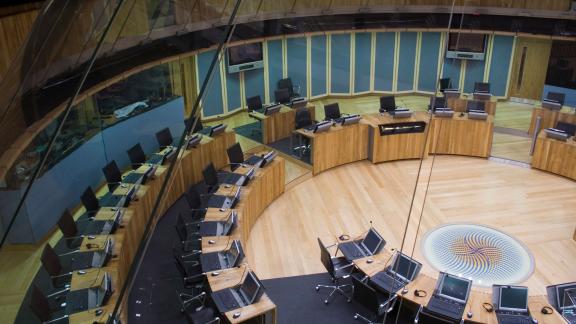We must all take the public with us to ensure sustainability of health and care services

This month, my Welsh NHS Confederation colleagues and I have been and reflecting on the importance of good communication and effective engagement at all levels.
We’ve witnessed the result of working in social partnership, with the ongoing, open dialogue between trade union partners and the Welsh Government resulting in an enhanced pay offer for Agenda for Change Staff. Although the end result is unknown at this time, there’s undoubtedly huge value in the fact the enhanced offer has been reached through collaborative means, giving all parties the chance to voice their concerns and put forward their position.
Our continuing priority is to effectively communicate the complex picture in which health and care services are currently operating. The challenges of meeting performance targets and accessing services cannot be considered in isolation, with the effect of system-wide pressures faced in the aftermath of the pandemic weighing heavily on the shoulders of all healthcare staff and leaders.
As we called for in our report on reshaping the relationship between the public and the NHS, governments must set out what the public is entitled to from the NHS and the contributions we can all make to our own health and wellbeing. This does sometimes happen, of course, but it’s often fragmented and unclear, with the messages the public receive about the state of services making for a confusing picture. What they need is clarity. Embedding learnings from the Covid pandemic and capitalising on the sense of common purpose, including improved cross-sector communication and the delivery of clear and consistent messaging across sector boundaries, will be key to enhancing public engagement going forwards.
An open and honest conversation is needed about what the NHS and social care can be expected to provide in the future.
To deliver on the long-term vision for health and care, developing the relationship between public services and citizens must be a priority. To quote the Parliamentary Review of Health and Social Care (January 2018): “Wales must be a listening nation through actively seeking out diverse views and experiences to co-design services with the public if we are to accelerate change and improve quality”. This is even more important in the current economic climate, where the whole public sector is being expected to deliver much more with much less. Now is the time for all political parties to be honest about this.
Public expectations have shifted and there’s a growing disconnect between what’s expected and what the service is able to deliver. We cannot push forward with delivering services in different ways if we’re not taking the public with us. We therefore urgently need meaningful dialogue to realign expectations. It’s crucial the public continue to feel personally invested in our service, and their own care, to help ensure its long-term sustainability.
The NHS belongs to us all and, as individuals, we should do what we can to ensure it is sustainable.
An open and honest conversation is needed about what the NHS and social care can be expected to provide in the future, and the newly established citizens voice body, Llais, will play an important role in this. Difficult decisions will have to be made between the demands of elective recovery, access to primary care, mental health and the generational task of reducing health inequalities. This has never been truer, given the heightened financial pressures NHS organisations are facing due to increased inflation and energy costs and the resulting cost-of-living crisis.
That is why NHS leaders require the Welsh and UK Governments and all politicians to be clear with the public about the scale of the challenge ahead. It’s also important to balance the political voice with the clinical voice: we know that clinicians and other health and care professionals have credibility with the public. We need clear, consistent, targeted communications, starting with the government, filtered down through all public sector bodies to local organisations and staff on the ground, that will help the public to understand that there is a long road ahead for NHS recovery.
Together we can engage the public in a conversation which aims to support people to look after their own health for the benefit of all. A cross-sector effort is required across health, housing, environmental, transport, the arts, economy, education and food policy to contribute to the wider ambition of healthier families living happier lives.
The NHS belongs to us all and, as individuals, we should do what we can to ensure it is sustainable.


